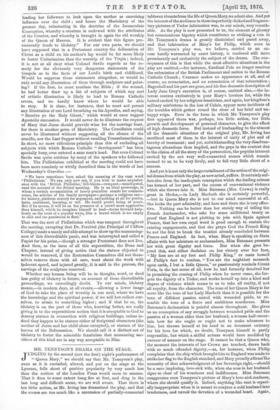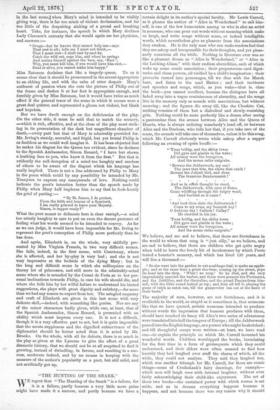MR. TENNYSON'S DRAMA ON THE STAGE.
JUDGING by the second (not the first) night's performance of " Queen Mary," we should say that Mr. Tennyson's play, even as it is curtailed, altered, and put on the stage at the Lyceum, falls short of positive popularity by very much less than the notices of the London Press would seem to assume. That it does to some extent hang fire at first, and drag in the last long and difficult scene, we are well aware. That there is too little action, as Mr. Irving has dramatised the play, and that the scenes are too much like a succession of partially-connected
tableaux vivants from the life of Queen Mary,we admit also. And yet the interest of the audience in these imperfectly-linked andfragmen- tary pictures of Tudor infatuation was, to our minds, very remark- able. As the play is now presented to us, the element of gloomy but conscientious bigotry which constitutes so striking a vein in Mr. Tennyson's drama is greatly diminished and pared away, and that infatuation of Mary's for Philip, which even in Mr. Tennyson's play was, we believe, carried to an ex- cess hardly warranted by exact history, is rendered still amore prominently and exclusively the subject of the drama. The con- sequence of this is that while the most effective situations in the play are omitted,—for instance, Cardinal Pole no longer receives the submission of the British Parliament and nation to the Roman Catholic Church ; Cranmer makes no appearance at all, and of course, no retractation, and no retractation of that retractation ; Bagenhall and his part are gone, and his fine dramatic description of Lady Jane Grey's execution is, of course, omitted also,—the in- terest centres exclusively in poor Mary's loveless lot, while the hatred excited by her religious fanaticism, and again, her kingdom's military misfortune in the loss of Calais, appear mere incidents of the troubles which gather round the close of her brief and un- happy reign. Even in the form in which Mr. Tennyson's play first -appeared there was, perhaps, too little action, too little growth and development of personal character, to give the effect of high dramatic force. But instead of husbanding to the utmost all the dramatic situations of the original play, Mr. Irving has sacrificed most of them in the interest of unity of plot and of brevity of treatment; and yet, notwithstanding the very disadvan- tageous alterations thus implied, and the gaps in the context due to the elision of all the story of the persecution, the popular interest excited by the not very well-connected scenes which remain seemed to us to be very lively, and to fall very little short of a success.
And yet it is not only the large curtailment of the action of the origi- nal drama from which the play, as now acted, suffers. It certainly suf- fers also from the inadequate conception which the leading actress has formed of her part, and the excess of conventional violence which she throws into it. Miss Bateman (Mrs. Crowe) is really great in Medea,—in Lady Macbeth she is certainly powerful,. —but in Queen Mary she is not to our mind successful at all. She looks the part admirably, and here and there she is very effec- tive. Nothing can be better than her stately way of telling the French Ambassador, who asks for some additional treaty as proof that England is not plotting to join with Spain against France, that her own royal word is good enough to sustain the existing engagements, and that she prays God the French King be not the first to break the treaties already concluded between France and England. In fact, when Mary is speaking on State affairs with her ministers or ambassadors, Miss Bateman presents her with great dignity and force. But when she goes be- yond this, and either declaims on her victory over her foes, " My foes are at my feet and Philip King," or casts herself at Philip's feet to confess, " You are the mightiest monarch upon earth, I but a little Queen," or passionately reminds Count Feria, in the last scene of all, how he had formerly deceived her in promising the coming of Philip when he never came, she for- gets the dignity of a Tudor, and works herself up into a kind and degree of violence which seems to us to take all reality, if not all royalty, from the character. The tone of her Queen Mary is far more like the tone of her Lady Macbeth than it is possible for the tone of diffident passion mixed with wounded pride, to re- semble the tone of a fierce and ambitious murderess. Miss Bateman's declamation is painful almost throughout. She gives us no conception of any struggle between wounded pride and the passion of a woman older than her husband, a woman half-uncer- tain how far she ought or ought not to make advances to him, but throws herself at his head in an incessant entreaty for his love for which, no doubt, Tennyson himself is partly responsible, but which a skilful actress would have modified by nuances of manner on the stage. It cannot be that a Queen who, the moment the interests of her Crown are touched, draws back with so much offended dignity,—as, for instance, when Philip complains that the ship which brought him to England was made to strike her flag to the English standard, and Mary proudly affirmithe necessity of that acknowledgment of her Sovereign right,—should be a mere imploring, love-sick wife, when she sees in her husband signs so clear of his weariness and indifference. Miss Bateman exaggerates even Tennyson's picture of Mary's love-sick madness, where she should qualify it. Indeed, anything like rant is especi- ally inappropriate when it is meant to conjure a cold husband into tenderness, and unveil the devotion of a wounded heart. Again, in the last scene,' when Mary's mind is intended to be visibly giving way, there is far too much of violent declamation, and far too little of the despairing sinking of a proud and breaking heart. Take, for instance, the speech in which Mary declines Lady Clarence's entreaty that she would again see her physician, and answers :— " Drugs—but he knows they cannot help me—says That rest is all ; tells me I must not think,— That I must rest—I shall rest by-and-by. Catch the wild cat, cage him, and when he springs And maims himself against the bars, say, 'Rest '; Why, you must kill him, if you would have him rest,— Dead or alive, you cannot make him happy."
Miss Bateman declaims that like a tragedy-queen. To us it seems clear that it should be pronounced in the accent appropriate to an ebbing life, and with the calm of utter despair. Mary's outburst of passion when she cuts the picture of Philip out of the frame and dashes it at her feet is appropriate enough, and forcibly given by Miss Bateman, but it would have twice as much effect if the general tenor of the scene in which it occurs were a great deal quieter, and represented a gloom not violent, but blank and hopeless.
But we have dwelt enough on the deficiencies of the play. On the other side, it must be said that to match the scenery, —which is rich, effective, and at the close of the play most strik- ing in its presentation of the dark but magnificent chamber of death,—every part but that of Mary is admirably provided for. Mr. Irving's stately, scornful, and frigid, but yet brutal Philip is as faultless as we could well imagine it. It has been objected that he makes his disgust for the Queen too evident, since he declares to the Spanish Ambassador, Simon Renard, " I have but shown a loathing face to you, who knew it from the first." But that is evidently the self-deception of a mind too haughty and careless of others to be aware of the disgust which his language has really implied. There is not a line addressed by Philip to Mary in the poem which could by any possibility be intended by Mr. Tennyson to express any masquerade of love. Nothing could indicate the poet's intention better than the speech made by Philip when Mary half implores him to say that he feels keenly the grief of parting :—
" By St. James, I do protest, Upon the faith and honour of a Spaniard, I am really grieved to leave your Majesty. Simon, is supper ready ?"
What the poet meant to delineate here is clear enough,—a mind too utterly haughty to care to put on even the decent pretence of feeling what his words seemed to be intended to convey. As far as we can judge, it would have been impossible for Mr. Irving to represent the poet's conception of Philip more perfectly than he has done.
And again, Elizabeth is, on the whole, very skilfully pre- sented by Miss Virginia Francis, in two very difficult scenes. She fails, indeed, in the first scene, with Courtenay, where she is affected, and her by-play is very bad ; and she is not very impressive at the bedside of the dying Mary ; but in the long and difficult scene in which she soliloquises on the thorny lot of princesses, and still more in the admirably-acted scene where she is sounded by the Count de Feria as to her per- sonal inclinations towards Philip, in case his wife should die, and where she foils him by her wilful failure to understand his hinted suggestions, she plays with great dignity and subtlety,—far more than we had any reason to expect from her. The mingled coquetry and craft of Elizabeth are given in this last scene with very delicate skill,—indeed, with something hie genius. Nor are any of the minor characters badly given, while one, at least, that of the Spanish Ambassador, Simon Renard, is presented with an ability which must impress every one. It is not a difficult, though it is a very effective part to act, but it is quite impossible that the astute suppleness and the dignified subservience of the diplomatist should be better acted than it is acted by Mr. Brooke. On the whole, with all its defects, there is so much in the play as given at the Lyceum to give the effect of a great dramatic history, that we should not be at all surprised to find it growing, instead of dwindling, in favour, and resulting in a suc- cess, moderate indeed, and by no means in keeping with the measure of the author's popularity as a poet, but still solid, and not artificially got up.































 Previous page
Previous page